
Our Eye Exam Pre-Testing: Thoroughness Is Essential
Our north Edmonton eye clinic specializes in eye care and prescription eyewear. Schedule an appointment with us today, and you will see how and why our Edmonton eye exams are considered one of the most thorough, comprehensive, advanced, and personalized available. Visit our optometrists and opticians at our Edmonton clinic today, and you will see how professional patient-first personalized eye care and eyewear enables you to be your very best. An eye exam today will better equip you to see the future!
Schedule An Exam Our Optometrists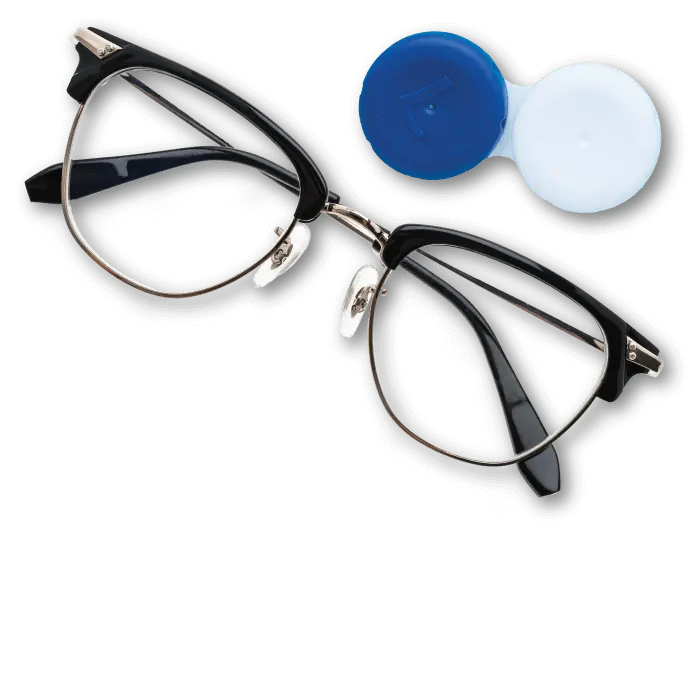
(780) 473-6123
Eye-deology Vision Care, Edmonton
Our Edmonton Eye Exams: This Is What Makes Them The Best!
- Experienced Edmonton Optometrists: When it comes to providing healthcare, there is no substitute for experience and know-how.
- Personalized Care: Every person and every eye is unique. We customize eye care based on the needs of our patients.
- A Professional Team That Cares: Eye care requires a team effort. Every one of our professionals contributes to patient care and service.
- State-of-the-Art Diagnostic Technology: Technologies promote the early detection of diseases causing irreversible vision loss.
- Thoroughness: Patient-first service that dedicates the time, resources, and know-how to provide world-class eye care.
- Patient Education: Our eye care professionals make every visit a friendly, informative learning experience.

1. Eye Exam Pre-Testing
Pre-testing is a detailed process that gathers all necessary information for the optometrist in advance of the optometrist-administered eye examination. This process involves completing a detailed patient history, as well as a series of standard tests. Pre-testing is an essential part of the comprehensive eye exam process, providing valuable information and visuals for both the optometrist and the patient.
1. Our Edmonton Eye Exam - Pre-Testing:
Medical & Vision History. Personalizing Eye Care
Information gained by asking specific questions, either of the patient or their caregivers, to obtain information useful in formulating a diagnosis and providing medical care to the patient. The medically relevant complaints reported by the patient are referred to as symptoms, in contrast with clinical signs, which are ascertained by direct examination. The medical history, together with the physical examination, enables the optometrist to form a diagnosis and treatment plan.
Schedule Eye Exam
2. Our Edmonton Eye Exam - Pre-Testing:
Auto-refraction. Establishing Baseline Refactive Error
An autorefractor is a computer-controlled machine used during an eye examination to provide an objective measurement of a person's refractive error and prescription for glasses or contact lenses. It achieves this by measuring how light is changed as it enters a person's eye. Auto-refraction is used to provide the starting point for the optometrist in subjective refraction tests.
Schedule Eye Exam
3. Our Edmonton Eye Exam - Pre-Testing:
Keratometry. Evaluating Cornea Curvature
Keratometry is the measurement of the corneal curvature; corneal curvature determines the power of the cornea. Differences in optical power across the cornea results in astigmatism, so keratometry measures astigmatism. A keratometer is the diagnostic instrument used to perform keratometry and to assess the extent and axis of astigmatism.
Schedule Eye Exam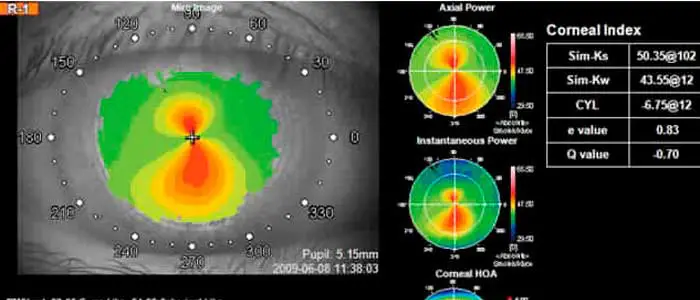
4. Our Edmonton Eye Exam - Pre-Testing:
Pachymetry. Assessing Corneal Thickness
Corneal pachymetry is the process of measuring the thickness of the cornea. A pachymeter is a medical device used to measure the thickness of the eye's cornea. Uses of the device include performing corneal pachymetry in advance of refractive surgery, screening for Keratoconus, and screening for patients suspected of developing glaucoma.
Schedule Eye Exam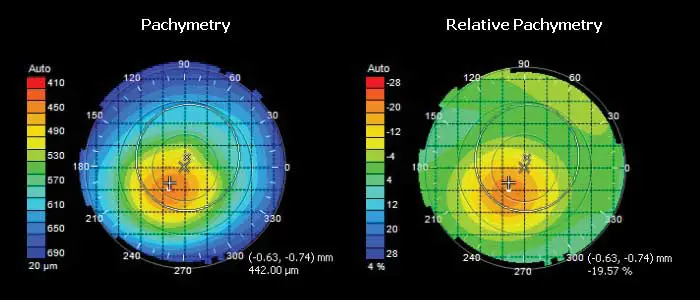
5. Our Edmonton Eye Exam - Pre-Testing:
Tonometry. Measuring Intraocular Pressure
A tonometry test measures the intraocular pressure (IOP), or pressure inside your eye. This test checks for glaucoma, an eye disease that can cause blindness by damaging the optic nerve in the back of the eye. Tonometry measures IOP by evaluating the resistance of your cornea to pressure. A non-contact tonometry test uses a puff of air to create pressure against your cornea.
Schedule Eye Exam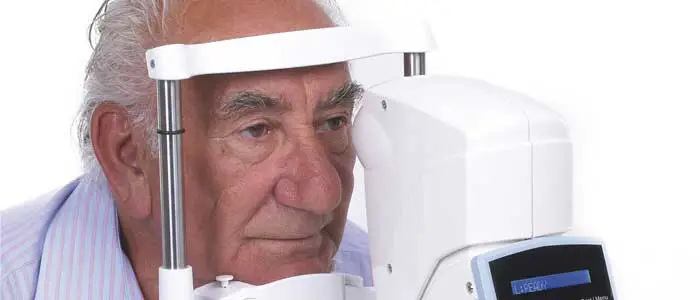
6. Our Edmonton Eye Exam - Pre-Testing:
Visual Field Screening. Assessing Field of Vision
A visual field test detects dysfunction in central and peripheral vision due to medical conditions such as glaucoma, stroke, brain tumours, or other neurological deficits. FDT stands for the Frequency Doubling Technology deployed during the test. During a visual field test, flickering targets randomly appear to the patient. Patients click a button each time they see a target.
Schedule Eye Exam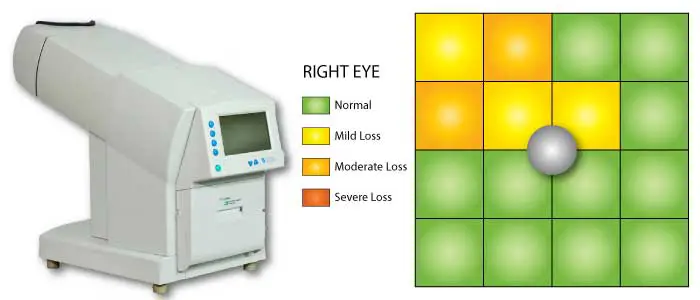
7. Our Edmonton Eye Exam - Pre-Testing:
Lensometry. Measuring Current Eyeglass Lenses
If a patient currently wears eyeglasses and the prescription of the lenses is unknown by the patient nor the doctor, then lensometry will be performed. A lensometer determines the sphere, cylinder, axis, and prism present in each lens. It also determines the focal power in multi-vision lenses (e.g., bifocals).
Schedule Eye Exam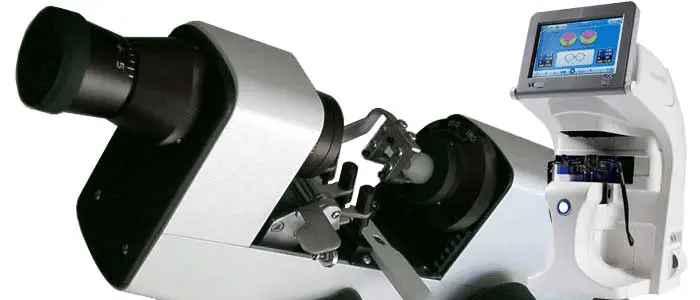
8. Our Edmonton Eye Exam - Pre-Testing:
Colour Test. Assessing For Colour Blindness
A colour blind test determines if you have a colour vision deficiency, or colour blindness. The most widely used screening test for colour blindness is the Ishihara Colour Vision Test, named after Japanese ophthalmologist Shinobu Ishihara. The Ishihara Colour Vision Test consists of a series of coloured plates comprising many dots of various colours, brightness, and sizes. The composition of circles enables a person with normal colour vision to see a single-digit or two-digit number, while a colour blind person will not.
Schedule Eye Exam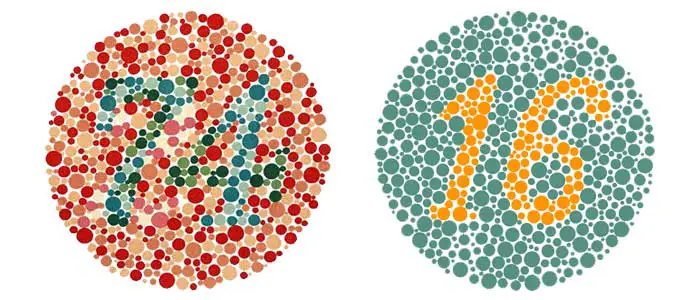
9. Our Edmonton Eye Exam - Pre-Testing:
Stereoscopic Vision Test. Assessing Depth Perception
Stereoscopic vision and depth perception testing is important for identifying diseases, such as amblyopia, strabismus, suppression, and stereopsis. Stereoscopic vision refers to how each eye may see an object from different angles but combines these angles to provide a three-dimensional image. During a stereoscopic vision test, the patient tries to identify the "raised" letter, shape, or animal as a means to measure depth perception and to evaluate if the patient's eyes are working together.
Schedule Eye Exam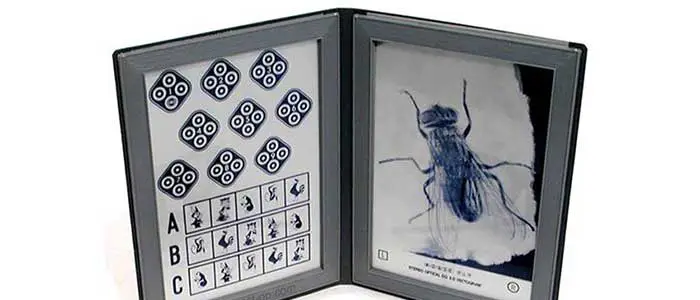
General Edmonton Eye Exam Questions
Annual eye exams are especially important for children and seniors, and for those individuals with systemic conditions, such as diabetes.
Our Edmonton Optometrists
Searching for an optometrist in Edmonton? Our experienced Edmonton eye doctors use advanced modern technologies and devote upwards of 500% more time towards providing personalized patient care than elsewhere so that they can see more and ensure that you may never see less. Position yourself to see the future with a visit to our eye clinic and Edmonton's best eye care!

Dr. Jennifer Ash, OD
Dr. Jennifer Ash is the Resident Optometrist at Eye-deology Vision Care. Dr. Ash provides patient care 5 days a week. Read more about Dr. Ash.

Dr. Ruhee Kurji, OD
Dr. Ruhee Kurji is an Associate Optometrist at Eye-deology Vision Care. Dr. Kurji provides patient care Tuesdays & Fridays. Read more about Dr. Kurji.

Dr. Jade McLachlin, OD
Dr. Jade McLachlin is an Associate Optometrist at Eye-deology Vision Care. Dr. McLachlin provides patient care 5 days a week. Read more about Dr. McLachlin.

Dr. Tania Mathews, OD
Dr. Tania Mathews is an Associate Optometrist at Eye-deology Vision Care. Dr. Mathews provides patient care 2 days a week. Read more about Dr. Mathews.
Learn Why Our Edmonton Optometrists Are The Best!


